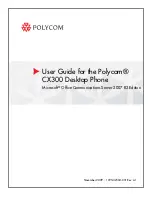
Supported address formats
The destination address that is entered using the caller’s endpoint can take a number of different formats, and
this affects the specific process that the VCS follows when attempting to locate the destination endpoint.
The address formats supported by the VCS are:
n
IP address, for example
10.44.10.1
or
3ffe:80ee:3706::10:35
n
H.323 ID, for example
john.smith
or
(note that an H.323 ID can be in the
form of a URI)
n
E.164 alias, for example
441189876432
or
6432
n
URI, for example
n
ENUM, for example
441189876432
or
6432
Each of these address formats may require some configuration of the VCS in order for them to be supported.
These configuration requirements are described below.
Dialing by IP address
Dialing by IP address is necessary when the destination endpoint is not registered with any system (such as
a VCS or other gatekeeper). See the
Dialing by IP address [p.201]
section for more information.
Endpoints registered to a VCS Expressway
Calls made by dialing the IP address of an H.323 endpoint registered directly with a VCS Expressway are
forced to route through the VCS Expressway. The call will therefore be subject to any restrictions configured
on that system.
Dialing by H.323 ID or E.164 alias
No special configuration is required to place a call using an H.323 ID or E.164 alias.
The VCS follows the usual
call routing process
, applying any transforms and then searching the Local Zone
and external zones for the alias, according to the search rules.
Note that SIP endpoints always register using an AOR in the form of a URI. You are recommended to ensure
that H.323 endpoints also register with an H.323 ID in the form of a URI to facilitate interworking.
Dialing by H.323 or SIP URI
When a user places a call using URI dialing, they will typically dial
.
If the destination endpoint is locally registered or registered to a neighbor system, no special configuration is
required for the call to be placed. The VCS follows the usual
search process
, applying any transforms and
then searching the Local Zone and external zones for the alias, according to the search rules.
If the destination endpoint is not locally registered, URI dialing may make use of DNS to locate the
destination endpoint. To support URI dialing via DNS, you must configure the VCS with at least one DNS
server and at least one DNS zone.
Full instructions on how to configure the VCS to support URI dialing via DNS (both outbound and inbound)
are given in the
URI dialing
section.
Cisco VCS Administrator Guide (X8.1.1)
Page 199 of 507
Dial plan and call processing
Supported address formats
















































